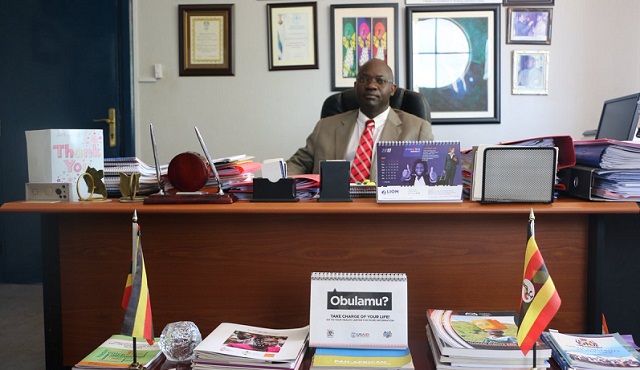
It’s a major human rights violation”. Even as their only tool is to advocate against human rights violations and challenging regime excesses in court, Sewanyana says the struggle for people’s freedoms has to continue. Now, he says they are in court challenging the proposed lining up for Local Council elections. This to him is an abuse of people’s rights. He says the government’s agenda should be promoting people’s rights and freedoms always by making policies and decisions that resonate with them.
A Call to State and Non-State Actors to uphold Corporate Accountability and Protection for Human Rights Defenders
The Legal Aid Service Providers Network (LASPNET) with support from ActionAid Uganda (AAU) is implementing the Fair, Green and Global II (FGGII) project which ensures improvement of government regulations, accountability and supporting Human Rights Defenders (HRDs) through provision of effective remedies. Under this project, LASPNET commissioned a research to highlight the operating environment for HRDs, challenges they face with recommendations to various stakeholders on how to address them. The findings revealed the operating environment in which HRDs to be continuously shrinking.
This is attributed to limited awareness of respective rights by the citizens, existence of restrictive laws, and weak implementation of the laws, ineffective response of justice systems to reported violations and culture of impunity by law enforcers. Further, there is immense power and resources held by multi-national corporations leading to state capture as governments seeks to attract and promote investment with little or no regard to violations meted on citizens.
“We are facing the highest intolerance levels in this country now and I do not think as human rights defenders, we should celebrate #HRDDay17,” Dr @LSewanyana . pic.twitter.com/VqybA6FaCe
— FHRI (@FHRI2) December 11, 2017
LASPNET convened a dialogue on 6th December 2017 for relevant stakeholders to deliberate on how to operationalize the recommendations from the report.In commemoration of the International Human Rights Day 2017 under the theme, stand up for someone’s human rights today, LASPNET revisits the outcomes from the dialogue to call on state and non-state actors to play their part in ensuring that HRDs are protected and have a conducive operating environment.
Highlights from the Dialogue on the nexus between human rights and development:
- Amidst rapid economic expansion, Government has the primary duty to respect and promote the rights of its citizens irrespective of their status, race or religion. It is the overall responsibility of the state is to ensure due provisions of benefits according to clear eligibility criteria, entitlements and proper administration of institutions and services.
- Translate laws such as the Constitution into local languages to ease understanding by all citizens
- Parliament through its Committee on Human rights should ensure implementation of the Universal Periodic Review recommendations on human rights defenders made to the government at the 2011 and 2016 sessions.
- In addition to enacting the Human Rights Defenders Bill into law specifically protecting the rights of HRDs, also enact other legislations such as the minimum wage bill and witness Protection Bill.
- Ensure adequate compensation for victims of land grabbing and engagement with communities that face land grabs and evictions by state and non-state actors in decision making processes.
- The Uganda Human Rights Commission to expedite the design and adoption of the National Action Plan on Business and Human rights
- Human rights defenders in partnership with the government agencies should continuously provide human rights education to law enforcement officers to minimize the human rights violations and ensure all victims of corporate abuses access effective remedy without interference from the state and non-state actors.
- Multinational corporations to ensure they undertake prior consultation and veto over corporate projects against coerced displacement in respect to free prior, and informed consent.
- Government should ensure that environmental protection policies are implemented to mitigate the negative impact of oil and other extractives on land and communities.
Conclusion
As Uganda sets up accountability and reporting mechanisms for achievement of the Sustainable Development Goals (SDGs), it is important to ensure that business obligations and contributions are harnessed while the potential risks and negative business impacts are mitigated. And as government races to achieve vision 2040 through investment, the rights of Ugandans should be at the forefront of every agreement, discussion and decision with multi- national corporations.
Democracy and good governance demand it and so do national laws as enshrined in the 1995 Constitution as well as the Universal Declaration of Human Rights, 1948 to which Uganda is a signatory. Development is for the people and hence their participation and protection should be at the fore of investment through a human rights based approach. As Justice Margaret Mutonyi, Resident Judge Mukono, said in her keynote address during the dialogue, “Land is the only valuable some people have, it’s their lifeline, their source of livelihood. When taken away, compensation should be adequate. Have a human face as you evict in the name of development”.
About LASPNET
Legal Aid Service Providers Network (LASPNET) is a National member based Non-Government organization established in 2004 to provide strategic linkages and a collaborative platform for legal aid service providers (LASPs) in Uganda. The Network maintains a common front to interface with the Justice Law and Order Sector and other like-minded stakeholders on issues of access to justice and the rule of law. It targets three critical aspects of: coordination bringing together different LASPs for solidarity in strategizing, sharing lessons and experiences, while minimizing duplication; capacitating them through collaborative research and analysis; as well as documenting, providing feedback, and amplifying their voice on key issues regarding access to justice and legal aid at regional, national and international level.
 The Independent Uganda: You get the Truth we Pay the Price
The Independent Uganda: You get the Truth we Pay the Price



